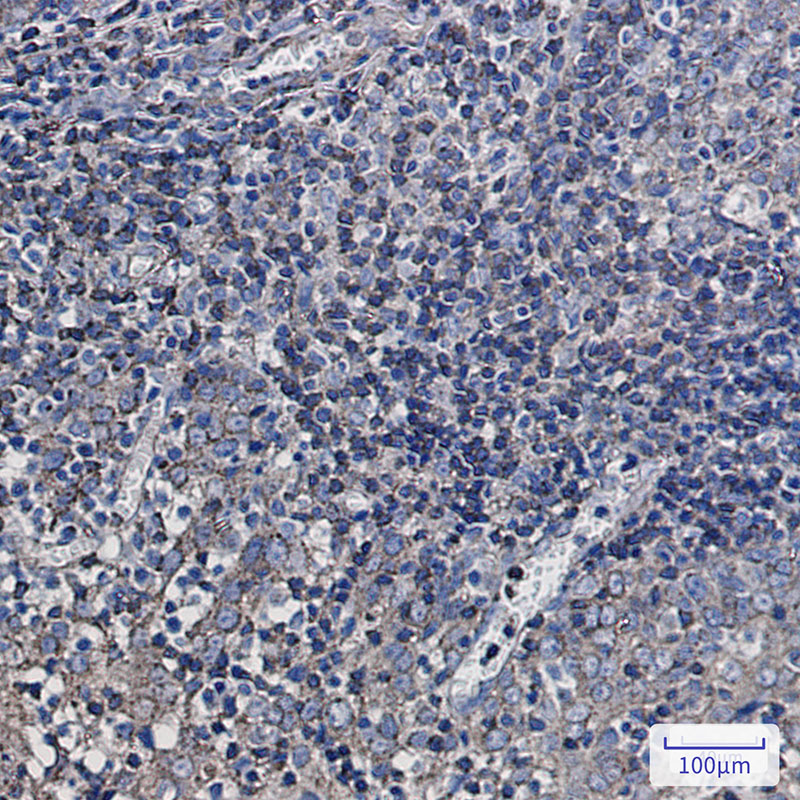

| WB | 1/500-1/1000 | Human,Mouse,Rat |
| IF | 咨询技术 | Human,Mouse,Rat |
| IHC | 1/50-1/100 | Human,Mouse,Rat |
| ICC | 技术咨询 | Human,Mouse,Rat |
| FCM | 咨询技术 | Human,Mouse,Rat |
| Elisa | 咨询技术 | Human,Mouse,Rat |
| Aliases | Pantophysin; SYPL1 |
| Entrez GeneID | 6856 |
| WB Predicted band size | Calculated MW: 29 kDa; Observed MW: 29 kDa |
| Host/Isotype | Rabbit IgG |
| Antibody Type | Primary antibody |
| Storage | Store at 4°C short term. Aliquot and store at -20°C long term. Avoid freeze/thaw cycles. |
| Species Reactivity | Human |
| Immunogen | Recombinant protein of human SYPL1 |
| Formulation | Purified antibody in TBS with 0.05% sodium azide,0.05%BSA and 50% glycerol. |
+ +
1. **"SYPL1 defines a vesicular pathway essential for sperm cytoplasmic droplet formation and male fertility"** by Liu et al.
- 摘要:研究揭示了SYPL1在小鼠精子形成中的作用,利用特异性抗体证实SYPL1在细胞囊泡运输中的关键功能,其缺失导致精子畸形和不育。
2. **"Synaptophysin-like protein 1 interacts with the GABA transporter 1 and regulates somatostatin receptor signaling"** by Ramamoorthy et al.
- 摘要:通过免疫共沉淀和Western blot分析,发现SYPL1与GABA转运蛋白相互作用,抗体实验表明其参与调节神经元信号传导和受体定位。
3. **"SYPL1 is a novel diagnostic marker for aggressive prostate cancer detected by antibody-based proteomics"** by Kristiansen et al.
- 摘要:利用SYPL1抗体进行组织微阵列分析,发现SYPL1在前列腺癌中高表达,可作为侵袭性肿瘤的生物标志物,与患者预后不良相关。
4. **"Characterization of SYPL1 as a regulator of synaptic vesicle exocytosis in hippocampal neurons"** by Wang et al.
- 摘要:通过免疫荧光和电镜技术,证实SYPL1抗体标记的蛋白在海马神经元突触小泡释放中起调控作用,影响神经递质释放效率。
Synaptophysin-Like Protein 1 (SYPL1) is a transmembrane protein belonging to the synaptophysin family, characterized by conserved domains involved in vesicle trafficking and membrane fusion. It shares structural homology with synaptophysin, a synaptic vesicle marker, but exhibits distinct tissue expression patterns. SYPL1 is widely expressed in non-neuronal tissues, including skeletal muscle, heart, and secretory cells, suggesting roles in intracellular vesicle transport, exocytosis, and membrane dynamics. Studies link SYPL1 to metabolic regulation, muscle function, and cancer progression, with altered expression observed in conditions like diabetes and malignancies.
SYPL1 antibodies are essential tools for detecting and studying the protein’s localization, expression levels, and interactions. Commonly used in techniques such as Western blotting, immunohistochemistry (IHC), and immunofluorescence (IF), these antibodies help elucidate SYPL1’s physiological and pathological roles. For instance, research utilizing SYPL1 antibodies has highlighted its involvement in insulin-responsive glucose uptake in adipocytes and its potential as a biomarker in certain cancers. Validation of SYPL1 antibodies includes specificity checks via knockout controls and cross-reactivity assessments. As interest grows in SYPL1’s functions beyond synaptic activity, these antibodies remain critical for exploring its contributions to cellular processes and disease mechanisms.
×